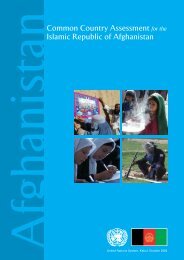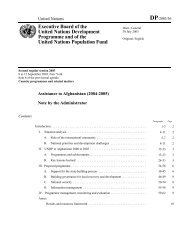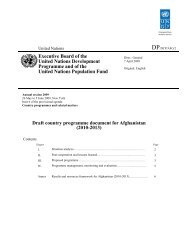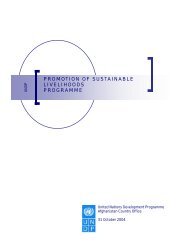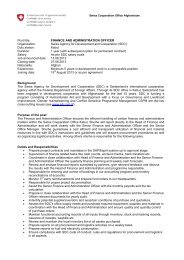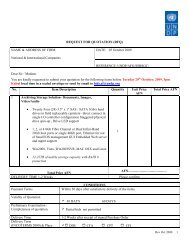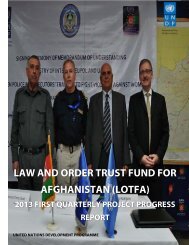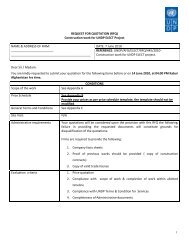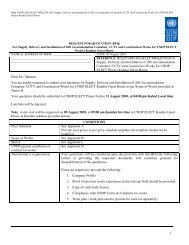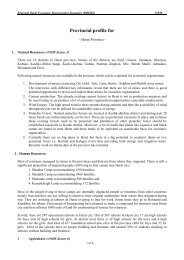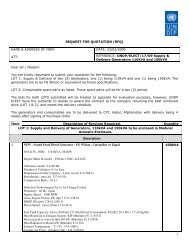Development Cooperation Report 2012 - UNDP Afghanistan
Development Cooperation Report 2012 - UNDP Afghanistan
Development Cooperation Report 2012 - UNDP Afghanistan
Create successful ePaper yourself
Turn your PDF publications into a flip-book with our unique Google optimized e-Paper software.
38<br />
Table 6: DPs Financing for ANDS Sectors<br />
Ranked<br />
Donors<br />
Commitments<br />
($millions)<br />
Disbursements<br />
($millions)<br />
Sectors engagement<br />
Average funding<br />
per sector ($millions)<br />
11 Sweden 101 101 7 14<br />
12 Norway 77 77 6 13<br />
13 India 72 0 5 14<br />
14 Denmark 65 65 5 13<br />
15 France 54 25 6 9<br />
16 Italy 52 50 7 7<br />
17 Finland 17 17 7 3<br />
18 Turkey 13 13 7 2<br />
19 Poland 9 9 4 2<br />
20 Czech Republic 4 3 6 0.6<br />
DEVELOPMENT COOPERATION REPORT<br />
The above analysis, though short of any analysis of the reasons behind donor sectoral<br />
involvement, indicates a strong need for a rationalisation of the current situation<br />
and clear division of labor to be defined and implemented among donors. The Aid<br />
Management Policy of the government envisages the introduction of criteria and<br />
a guidance to donors to specify their sectoral engagement based on their sectoral<br />
expertise and their comparative advantage. Such a mechanism will help bring<br />
uniformity to sectoral engagement, promote the notion of balanced development<br />
and will reduce the transaction costs associated with donor coordination.<br />
FROM KABUL TO TOKYO<br />
At the 2010 Kabul Conference, the government of <strong>Afghanistan</strong> and the international<br />
community reached broad consensus on what constituted development priorities to<br />
facilitate meaningful transition in socio-economic sectors and to bridge the Transition<br />
and the Transformation periods. Year 2011, provided the time needed for the Afghan<br />
government to work closely with the international community and develop the<br />
comprehensive National Priority Programs (NPPs) and to craft a strategy that will<br />
guide <strong>Afghanistan</strong> towards self reliance and reduce its dependence on foreign aid for<br />
development and delivery of services.<br />
This section of the report provides a summary of the the Afghan government’s<br />
strategy for achieving self-reliance, the outcome of the Tokyo conference, and the<br />
aid management policy that will help <strong>Afghanistan</strong> steer foreign aid in support of its<br />
priority programs in an effective manner.



